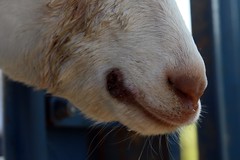 Soremouth is widespread in the U.S. sheep and goat population. In a 2001 USDA NAHMS* survey, 40 percent of U.S. sheep operations reported having soremouth in their flocks during the previous three years.
Soremouth is widespread in the U.S. sheep and goat population. In a 2001 USDA NAHMS* survey, 40 percent of U.S. sheep operations reported having soremouth in their flocks during the previous three years.Soremouth affects all breeds of sheep and goats. The disease tends to be more severe in goats than sheep. Antidotal evidence suggests that some breeds may be more susceptible than others (e.g. Boer). Soremouth is a zoonotic disease meaning animals can transmit it to humans. In people, it's called orf.
Soremouth is rarely fatal, though it can cause significant economic loss. It causes lesions on the nose, mouth, and sometimes other parts of the body. The lesions can make it painful for the animals to nurse or eat dry feed.
Treatment is usually unrewarding, as soremouth is a viral disease that does not respond to antibiotics. Sometimes, antibiotics are necessary for secondary infections that may develop in the affected animal. The disease usually runs its course in 1 to 4 weeks. The scabs fall off and the affected tissue heals.
A live vaccine is available for sheep and goats, but it should not be used on farms that have never had soremouth.
*National Animal Health Monitoring System (USDA-APHIS)
Read full article
